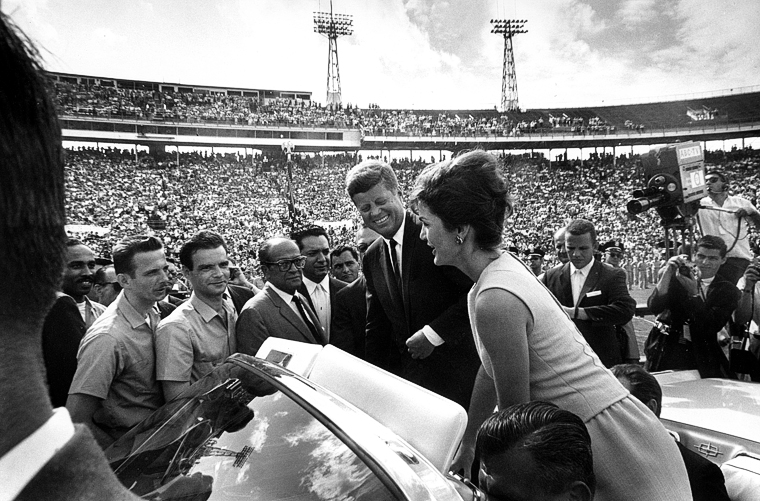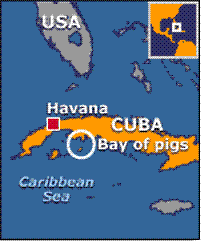
The Bay of Pigs, the Brigade 2506 and Trump’s promise
One thing that makes Americans cynical about politics is that sources of mainstream opinion get euphoric when political leaders break their promises.
“Scarcely 12 weeks into his presidency,” the Los Angeles Times observes, “(President) Trump has backed off or reversed many of his most provocative campaign promises on foreign policy.”
Simply hearing President Trump say NATO is not obsolete, China is not a currency manipulator, and the Export-Import Bank is a good thing made their knees buckle. A few more weeks like this, as one Washington narrative suggests, and President Trump will have navigated all the way to the center.
We’ll see. As Brian Goldsmith wrote for The Atlantic last year, “Once in office, presidents almost always try to carry out their pre-election agendas. When they’re unable to keep those promises, it’s usually because of congressional opposition [think health care] – not because they’ve discarded campaign rhetoric to pursue other goals.” Scholars have examined the record – from Roosevelt to Reagan – and found “two-thirds of the winning candidate’s policy pledges were at least partially fulfilled after four years.”
That’s what the research says, and that is what President Trump’s chief strategist intends for him to do. As Steve Bannon told the Washington Times, “He’s laid out an agenda with those speeches, with the promises he made, and our job every day is just to execute on that … And he’s maniacally focused on that.”
Where does that leave Cuba? This question seems especially apt as we approach April 17th, the anniversary of the Bay of Pigs invasion.
It was on April 17th, 1961, that “the Cuban-exile invasion force, known as Brigade 2506, landed at beaches along the Bay of Pigs and immediately came under heavy fire,” the John F. Kennedy Presidential Library explains. “Cuban planes strafed the invaders, sank two escort ships, and destroyed half of the exiles’ air support.”
From there, the plan fell apart. Over 100 of the attackers were killed, and almost 1,200 members of Brigade 2506 were captured. It took 20 months of direct diplomacy between the U.S. and Cuba’s government for the brigade prisoners to be released from captivity. Then, according to the Kennedy Library’s account, “surviving brigade members gathered for a ceremony in Miami’s Orange Bowl, where the brigade’s flag was handed over to President Kennedy. ‘I can assure you,’ the president promised, ‘that this flag will be returned to this brigade in a free Havana.'”
More than a half-century later, the Brigade 2506 Veterans Association formally endorsed Donald Trump for president, the first endorsement for president ever made by the Brigade. The Brigade veterans were embraced by the campaign and by some hardliners in the Cuban American community; they were vilified by others. But they did so out of the conviction that if Mr. Trump were to be elected president, he would honor his pledge to undo the Obama opening unless the government of Cuba agrees to his demands, as he tweeted it should. History, of course, teaches us the Cubans are not going to obey.
President Kennedy, as we noted previously, did not understand the consequences of going forward with the Bay of Pigs invasion. President Trump’s National Security Advisor, Lt. General H.R. McMaster, wrote a book, “Dereliction of Duty,” about how defense and foreign policy decisions went off the rails; it was thanks, in part, to “President Kennedy’s informal style and structure of decision making (which) did not allow for a systematic review of the planned invasion of Cuba.”
Monday is both the anniversary of the Bay of Pigs and the 88th day of President Trump’s administration. Much of Washington is eyeing the calendar and the clock as we move closer to Day 100 and, perhaps like Steve Bannon, we’re maniacally focused on whether the Cuba campaign promise to Brigade 2506 and others will be honored or become another part of the supposed move to the center.
The Center for Democracy in the Americas has submitted a defense of the existing Cuba policy to the National Security Council staff at the White House, which is coordinating President Trump’s review of Cuba policy. We plan to release what we submitted early next week. It would be a testament to Lt. General McMaster’s belief in good process for the NSC in 2017 to do better by President Trump than President Kennedy did by the process in 1961. So we hope that our views — and those expressed by others — will help to persuade the administration to stay the course.
At some point, either we or the Bay of Pigs brigade will be disappointed. Whatever happens, it will be a reminder — to paraphrase George Orwell — that some campaign promises are more equal than others. That’s especially true when it comes to President Trump and Cuba; after all, he’s made so many.
(From Cuba Central)

